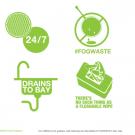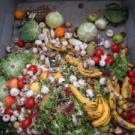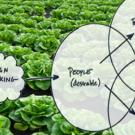Research in this area pertains to the drivers of and solutions to food waste on the consumer end. Post-purchase waste currently holds the largest potential for prevention of food loss. Solutions from standardized labeling to improved systems for donations can drastically reduce the waste that happens beyond the grocery store. Goals in this area include researching ways to minimize food waste by consumers and support policies that would increase food and information access.
Consumer Behavior and Awareness
Projects
Publications
Orta-Aleman D, Zuercher MD, Bacon KA, Chelius C, Hecht CE, Hecht K, Ritchie LD, Cohen JFW, Gosliner W. Students’ Perspectives on the Benefits and Challenges of Universal School Meals Related to Food Accessibility, Stigma, Participation, and Waste. Journal of Nutrition Education and Behavior, published online ahead of print, 18 June 2024. DOI: https://doi.org/10.1016/j.jneb.2024.04.011
K. Kiesel, S. Kiely, and R. E. Goodhue. 2023. Product innovation and promotion of value-added products via marketing cooperatives. In M. S. Elliott and M. A. Boland (Eds.) Handbook of Research on Cooperatives and Mutuals. Edward Edgar Publishing: 447-493.
K.Kiesel, H. Lang, and R. J. Sexton 2023. A New Wave of Sugar-Sweetened Beverage Taxes: Are They Meeting Policy Goals and Can We Do Better? Annual Review of Resource Economics.15:407–32. https://doi.org/10.1146/annurev-resource-11152211132
A. Spalding, R. E. Goodhue, K. Kiesel, R. J. Sexton. 2022. Economic impacts of food safety incidents in a modern supply chain: E. coli in the romaine lettuce industry. American Journal of Agricultural Economics. https://doi.org/10.1111/ajae.12341
B. Goodrich, K. Kiesel, & E. Bruno. 2021. Differential Impacts of the COVID-19 Pandemic on California’s Produce and Nut Industries. Western Economics Forum, 19 (1): 58-74.
Wiriyaphanich, T., J.X. Guinard, E. Spang, G. A. Challamel, R. T. Valgenti, D. Sinclair, S. Lubow, E. Putnam-Farr. Food Choice and Waste in University Dining Commons—A Menus of Change University Research Collaborative Study. Foods 2021, 10(3), 577; https://doi.org/10.3390/foods10030577
S. B. Villas-Boas, K. Kiesel, J. P. Berning, H. H. Chouinard, and J. J. McCluskey. 2020. Consumer and Strategic Firm Response to Nutrition Shelf Labels. American Journal of Agricultural Economics 102(2): 458–479.
Kurzer, A., T. Wiriyaphanich, C. Cienfuegos, E. Spang, J. Guinard. (2020) Exploring fruit’s role in dessert: The Dessert Flip and its impact on university student acceptance and food waste. Food Quality and Preference, Vol 83. doi: 10.1016/j.foodqual.2020.103917
K. Kiesel and A. Spalding. 2019. New Marketing Opportunities for Local Food Producers. ARE Update 23 (1): 1-4.
Gosliner, W., T. Delaney, S. Caldwell, J. M. Lee, N. Billups, S. Floor. (2019). The Planning, Implementation, and Evaluation of California's Inaugural Food Waste Prevention Week. Journal of Public Health Management and Practice. doi: 10.1097/PHH.0000000000000896
Napawan N. Claire, Ellen Burke, and Sahoko Yui. (2017) “Women’s Work: An Eco-Feminist Approach to Environmental Design,” Avery Review 27.
Kaiser L, Lamp C, Ganthavorn C, Farfan-Ramirez L, Behar M, Cantwell M, Hardesty S. 2015. UCCE efforts improve quality of and demand for fresh produce at WIC A-50 stores. Calif Agr 69(2):105-109.
Napawan, N. C. (2015). “Productive Place: Evaluating Communally-Managed Urban Farms as Public Space,” Landscape Journal.
Scherr R, Cox R, Feenstra G, Zidenberg-Cherr S. 2013. Integrating local agriculture into nutrition programs can benefit children's health. Calif Agr 67(1):30-37.
Eating Right in America: The Cultural Politics of Food and Health Charlotte Biltekoff. Durham, NC: Duke University Press, 2013.






